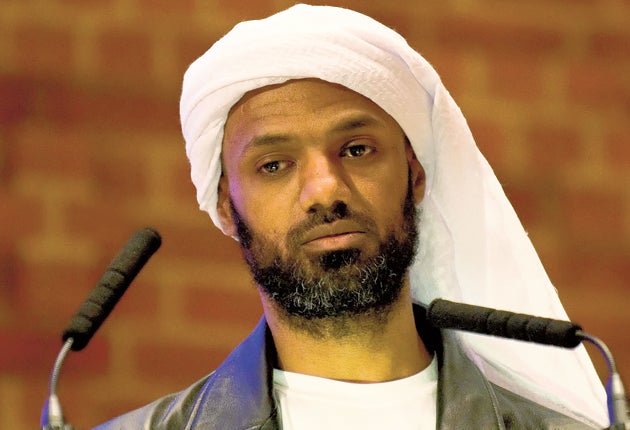Victims of extraordinary rendition cannot sue, US court rules
Legal action by terror suspects sent by the CIA to foreign countries for torture blocked on national security grounds

Your support helps us to tell the story
From reproductive rights to climate change to Big Tech, The Independent is on the ground when the story is developing. Whether it's investigating the financials of Elon Musk's pro-Trump PAC or producing our latest documentary, 'The A Word', which shines a light on the American women fighting for reproductive rights, we know how important it is to parse out the facts from the messaging.
At such a critical moment in US history, we need reporters on the ground. Your donation allows us to keep sending journalists to speak to both sides of the story.
The Independent is trusted by Americans across the entire political spectrum. And unlike many other quality news outlets, we choose not to lock Americans out of our reporting and analysis with paywalls. We believe quality journalism should be available to everyone, paid for by those who can afford it.
Your support makes all the difference.The victims of the Bush administration's programme of "extraordinary rendition" will not be able to sue the private company which transported them to foreign countries for torture by the CIA, after the present White House stepped in to squash their lawsuit on the grounds of national security.
A California court has sided with the Obama administration, which argued that a case led by the British resident Binyam Mohamed against the aerospace giant Boeing was bound to reveal state secrets and sensitive intelligence information.
Legal supporters of Mr Mohamed raised uproar at the decision, which the judge in charge of the case said had presented a "painful conflict between human rights and national security".
Ben Wizner, attorney with the American Civil Liberties Union, who argued the case, called it "a sad day not only for the torture victims whose attempt to seek justice has been extinguished, but for all Americans who care about our nation's reputation in the world", and vowed to appeal to the US Supreme Court. "To date, not a single victim of the Bush administration's torture programme has had his day in court," the attorney said.
Reprieve, which campaigns for the human rights of prisoners, said the California court had "derailed another precious chance at a legal reckoning with the excesses of the war on terror". The group's executive director, Clare Algar, said: "Yet again, those responsible for torture and rendition have used 'state secrecy' to avoid facing up to their crimes in court."
President Barack Obama called an end to the use of torture and extraordinary rendition. But in a string of cases related to the treatment of terrorism suspects and other national security issues, the Obama administration has adopted and extended its predecessor's efforts to protect state secrets and intelligence sources from public disclosure. Disappointed human rights campaigners also point out that Guantanamo Bay prison camp in Cuba remains open, eight months after Mr Obama's promised deadline for shutting it down.
Ethiopian-born Mr Mohamed and fellow complainants accused Jepperson Dataplan, a Boeing subsidiary, of arranging illegal rendition flights for the CIA and sought damages. In a narrow 6-5 ruling that reversed a lower court decision, the US Court of Appeals for the Ninth Circuit said this was a "rare" case where national security concerns trumped the right to a trial.
Judge Raymond Fisher said: "We have tried our best to evaluate the competing claims of plaintiffs and the government and resolve that conflict according to the principles governing the state secrets doctrine set forth by the US Supreme Court."
The ruling stands in contrast to a UK Court of Appeals judgment earlier this year which forced disclosure of intelligence documents detailing how much MI5 knew about Mr Mohamed's case. And in a signal that the US appeals panel decision was a complex one, it ordered the government to pay the plaintiffs' legal costs.
"The attorney general adopted a new policy last year to ensure the state secrets privilege is only used in cases where it is essential to protect national security," a US Justice department spokesman said after Wednesday's ruling. "We are pleased that the court recognised that the policy was used appropriately in this case." Boeing declined to comment.
Mr Mohamed was captured in Pakistan in 2002 and flown to Morocco, where he says he was tortured at a CIA "black site" with the involvement of British and US intelligence agencies. His penis was repeatedly cut with a scalpel to force him to confess as an al-Qai'da terrorist. After Morocco, he spent four months in a CIA prison in Kabul before ultimately being flown to Guantanamo Bay. He was released in February 2009, and his pursuit of justice on both sides of the Atlantic since then has caused ructions in the relationship between the US and the UK.
He sued the British authorities after it was revealed that MI5 supplied lists of questions to be put to him while he was being held in Morocco and elsewhere. The British Government fought to block the disclosure of intelligence information exchanged between the secret services of the UK and the US, but lost that fight in the UK Court of Appeal in February this year.
Join our commenting forum
Join thought-provoking conversations, follow other Independent readers and see their replies
Comments